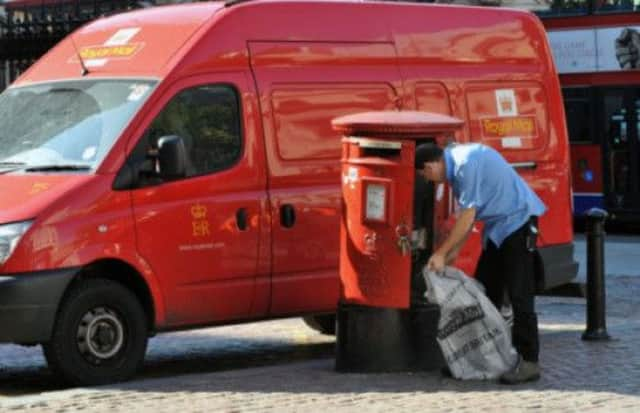£1bn profit in day ‘proves Royal Mail sold too cheaply’


City pension funds and other institutions were the biggest beneficiaries, making tens of millions in the first day’s trading.
Nearly 700,000 small investors saw their £749 stakes increase by about £280 as the original 330p price closed up more than a third at 455p, while some 150,000 postal workers could be sitting on stakes worth more than £3,000.
Advertisement
Hide AdAdvertisement
Hide AdBig investors, some of whom bought millions of shares, will have seen the value of their stake rise dramatically.
More than 100 million shares were traded in the first hour, sending the price up to a high of almost 460p.
The closing price values the letter and parcel delivery firm at £1.25 billion above the £3.3bn implied by the offer price.
Amid flotation fever in the City, ministers faced accusations that financiers have been allowed to profit from public assets being sold off cheaply.
TUC general secretary Frances O’Grady claimed it was “little different from selling £5 notes for four quid”.
She went on: “Let’s not forget that this has taken something that belonged to all of us and given a large slice away to those who could afford an entry ticket.
“And everyone knows that, in the long run, the postal service will get worse, just as other privatised industries have ended up abusing markets and ripping off consumers.”
But the criticisms were dismissed by Business Secretary Vince Cable who said yesterday’s big share price increase was just “froth and speculation” and that long-term, stable investors had picked up the bulk of the stock.
Advertisement
Hide AdAdvertisement
Hide AdPrime Minister David Cameron also brushed off concerns and said: “Royal Mail … can now access capital and access private sector management techniques.”
He said the privatisation was good for the whole economy, adding: “As for price, let’s see what happens in the days and weeks ahead. What really matters is this has got off to a very good start.”
But Labour leader Ed Miliband said: “It’s a fire-sale of a great institution at a knockdown price. It has been undervalued for taxpayers and undervalued for customers.
“It’s a dogmatic privatisation by this government and they have made it even worse by undervaluing it. The government are doing it for ideology and it’s not in the best interests of this country.”
Many investors will not be able to sell their shares until full trading begins on Tuesday, but those who bought through brokers were able to cash in, with bundles of 227 being sold off throughout the morning.
The value of free shares given to about 150,000 Royal Mail staff – a 10 per cent stake in the company – will be priced on Tuesday. Based on last night’s close, it would work out at more than £3,000 per employee. However, staff cannot sell for three years. A further 15,000 workers took part in the offer to buy shares.
Bristol stockbroker Hargreaves Lansdown apologised after “unprecedented demand” crashed its website and left phone lines jammed, with investors unable to trade. Chief executive Ian Gorham said it had prepared for substantial demand, but volumes had “gone off any conventional scale”.
After the sell-off, taxpayers have been left with a 37.8 per cent stake in the company, though this could be reduced to 30 per cent depending on a so-called “over-allotment” option, which is dependent on price performance after the flotation.
Advertisement
Hide AdAdvertisement
Hide AdThe Scottish Government has said it will be renationalise Royal Mail if Scots vote for independence. First Minister Alex Salmond said yesterday: “Well, they’ve obviously underpriced the shares because they want to be able to claim a success. You know, good luck to the folk who’ve got the shares, but it’s not a success for the public as a whole.
“It means that assets have been sold off at an underpriced level. Of course, the problem is that, yeah, of course, people get an initial gain on their shares but, as we’ve seen from the privatisation of essential public services, people tend to pay for it in the future.”
Labour’s shadow business minister, Ian Murray MP, said: “This is a government that tells us we cannot afford to house the disabled but think losing £600m due to their undervaluation of Royal Mail is ‘froth’.
“As the clamour for shares has shown, taxpayers have been shortchanged by the Tory-Lib Dem government with the privatisation of our much-cherished Royal Mail, a privatisation Labour has opposed outright.”
Billy Hayes, leader of the Communication Workers Union (CWU), said Mr Cable had made one of the “stupidest” mistakes in politics.
Trade unions have threatened to strike over the privatisation and disrupt the busy Christmas mail period. CWU members are being balloted on strike action, with the result due to be announced next week.
SEE ALSO: